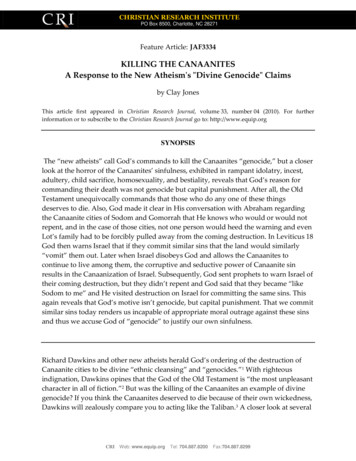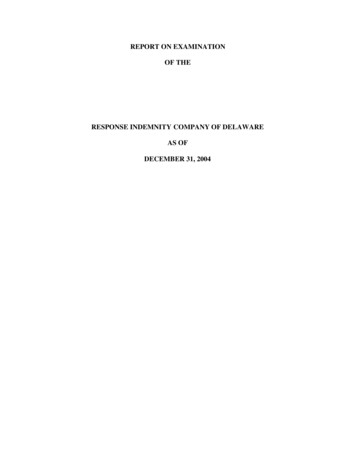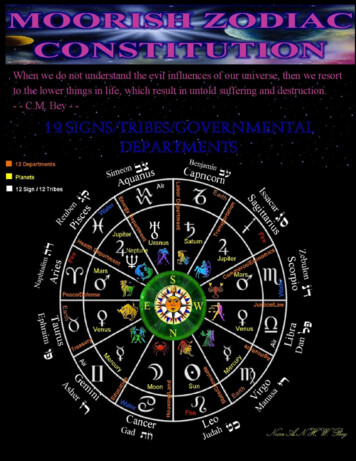
Transcription
CHRISTIAN RESEARCH INSTITUTEPO Box 8500, Charlotte, NC 28271Feature Article: JAF3334KILLING THE CANAANITESA Response to the New Atheism's "Divine Genocide" Claimsby Clay JonesThis article first appeared in Christian Research Journal, volume 33, number 04 (2010). For furtherinformation or to subscribe to the Christian Research Journal go to: http://www.equip.orgSYNOPSISThe “new atheists” call God’s commands to kill the Canaanites “genocide,” but a closerlook at the horror of the Canaanites’ sinfulness, exhibited in rampant idolatry, incest,adultery, child sacrifice, homosexuality, and bestiality, reveals that God’s reason forcommanding their death was not genocide but capital punishment. After all, the OldTestament unequivocally commands that those who do any one of these thingsdeserves to die. Also, God made it clear in His conversation with Abraham regardingthe Canaanite cities of Sodom and Gomorrah that He knows who would or would notrepent, and in the case of those cities, not one person would heed the warning and evenLot’s family had to be forcibly pulled away from the coming destruction. In Leviticus 18God then warns Israel that if they commit similar sins that the land would similarly“vomit” them out. Later when Israel disobeys God and allows the Canaanites tocontinue to live among them, the corruptive and seductive power of Canaanite sinresults in the Canaanization of Israel. Subsequently, God sent prophets to warn Israel oftheir coming destruction, but they didn’t repent and God said that they became “likeSodom to me” and He visited destruction on Israel for committing the same sins. Thisagain reveals that God’s motive isn’t genocide, but capital punishment. That we commitsimilar sins today renders us incapable of appropriate moral outrage against these sinsand thus we accuse God of “genocide” to justify our own sinfulness.Richard Dawkins and other new atheists herald God’s ordering of the destruction ofCanaanite cities to be divine “ethnic cleansing” and “genocides.”1 With righteousindignation, Dawkins opines that the God of the Old Testament is “the most unpleasantcharacter in all of fiction.”2 But was the killing of the Canaanites an example of divinegenocide? If you think the Canaanites deserved to die because of their own wickedness,Dawkins will zealously compare you to acting like the Taliban.3 A closer look at severalCRI Web: www.equip.orgTel: 704.887.8200Fax:704.887.8299
key facts will help explain God’s reason for the destruction of the Canaanites and revealhow our own sinfulness demonstrates our incapacity to judge rightly.That atheists are incapable of judging spiritual matters leads some Christiansto wonder why we even need to answer them at all, especially if they lack any objective,moral, or epistemological foundation for their claims. Moreover, most atheists do notcustomarily condemn the very practices that God condemns, for example, idolatry,adultery, and homosexuality. Predictably so, their values conflict with what God hates.Concerning the destruction of the Canaanites, atheists especially like to exploitthe Christian condemnation of genocide. They reason something along these lines: (1)Christians condemn genocide. (2) Yahweh’s command to kill the Canaanites was an actof divine genocide. (3) Therefore, Christians should condemn Yahweh for commandinggenocide.The second premise is false, however. Part of the goal of this essay is to offerevidence to show that God had good reason to command Israel to kill the Canaanites. InLeviticus 18 and elsewhere, for example, the Bible reveals that God punished theCanaanites for specific grievous evils. Also, this wasn’t the entire destruction of a raceas God didn’t order that every Canaanite be killed but only those who lived withinspecific geographical boundaries (Josh. 1:4). Canaanite tribes (especially the Hittites)greatly exceeded the boundaries that Israel was told to conquer. And since, as we willsee, He punished Israel when they committed the same sins, what happened to theCanaanites was not genocide, but capital punishment.This wasn’t merely punishment, however. God sought to reveal His standardsof righteousness to a thoroughly corrupted humankind, and He chose Israel out of thenations to exhibit the requirements for relationship with Him (Deut. 4:5–8). Before Heredeemed humankind, He needed to unambiguously demonstrate what exactly He wasredeeming them from: a blatant and unrestrained evil that resulted in a worthless,nasty, and cruel existence. God knows what is best for humankind, but He allowed freecreatures to rebel and find out on their own that He is right. If Jesus had died to redeemhumankind prior to humankind’s comprehending the depth of their sin, then peoplewould question the need for Jesus’ death. Why would Jesus die for basically good folk?God waited to redeem humankind until they had the chance to be, as 2 Live Crew onceput it, “as nasty as they wanna be.”THE CANAANITES WERE WICKEDThe Bible is explicit concerning the sins of the Canaanites: idolatry, incest,adultery, child sacrifice, homosexuality, and bestiality. Much of what follows is horrific,but if we refuse to look, will we really understand the reasons for God’s judgment?Idolatry. The Canaanites worshiped other gods, which the Old Testament frequentlydenounced as no more than sticks or pottery made by human hands that could not “seeor hear or eat or smell” (Deut. 4:28 NIV). Yahweh derided these handmade gods thatcannot speak and must be carried because they cannot walk (Jer. 1:16; 8:2–5).CRI Web: www.equip.orgTel: 704.887.82002Fax:704.887.8299
The Canaanites took seriously the testimony of the Old Testament witness ofYahweh and His revelation, if for no other reason than intentionally to transform thescriptural depiction of Yahweh into a castrated weakling who likes to play with Hisown excrement and urine.4Of course Dawkins complains that “God’s monumental rage whenever hischosen people flirted with a rival god resembles nothing so much as sexual jealousy ofthe worst kind.”5 But does anyone think that if Dawkins’s wife left him for agingerbread man of her own baking, and then she began to tell everyone that he likedto play with his excrement, that Dawkins would tolerate the characterization of hisfeelings as no more than “sexual jealously of the worst kind”?Idolatry perverts our ability to love what Yahweh loves. Consequently, welove what He hates, and we hate what He loves. The story of Canaanite incest, adultery,child sacrifice, homosexuality, and bestiality flow out of the plot line of idolatry. Thetragedy of this story is that not only is idolatry an offense to Yahweh, but it fails tosupply a happy ending for human communities as well.Incest. Like all Ancient Near East (ANE) pantheons, the Canaanite pantheon wasincestuous. Baal has sex with his mother Asherah,6 his sister Anat, and his daughterPidray,7 and none of this is presented pejoratively.Although early Canaanite laws proscribed either death or banishment for mostforms of incest, after the fourteenth century BC, the penalties were reduced to no morethan the payment of a fine.8 In the larger ANE context, it is helpful to consider that inan Egyptian dream book dreams of having sex with your mother or your sister wereconsidered good omens.9Adultery. Canaanite religion, like that of all of the ANE, was a fertility religion thatinvolved temple sex. Inanna/Ishtar, also known as the Queen of Heaven, “became thewoman among the gods, patron of eroticism and sensuality, of conjugal love as well asadultery, of brides and prostitutes, transvestites and pederasts.”10 As University ofHelsinki professor Martti Nissinen writes, “Sexual contact with a person whose wholelife was devoted to the goddess was tantamount to union with the goddess herself.”11The Canaanites even remake the God of the Bible, El, after their own imageand portray Him ceremonially as having sex with two women (or goddesses). Theceremony ends with directions: “To be repeated five times by the company and thesingers of the assembly.”12 About this John Gray comments, “We may well suppose thatthis activity of El was sacramentally experienced by the community in the sexual orgiesof the fertility cult which the Hebrew prophets so vehemently denounced.”13Child sacrifice. Molech was a Canaanite underworld deity14 represented as an upright,bullheaded idol with a human body in whose belly a fire was stoked and in whoseoutstretched arms a child was placed that would be burned to death. The victims werenot only infants; children as old as four were sacrificed.15 Kleitarchos reported that “asthe flame burning the child surrounded the body, the limbs would shrivel up and theCRI Web: www.equip.orgTel: 704.887.82003Fax:704.887.8299
mouth would appear to grin as if laughing, until it was shrunk enough to slip into thecauldron.”16Homosexuality. No ANE text condemns homosexuality. Additionally, some ANEmanuscripts talk about “party-boys and festival people who changed their masculinityinto femininity to make the people of Ishtar revere her.”17Let us also remember that the problem with the Canaanite city of Sodomwasn’t just sex among consenting adults: the men of Sodom, both young and old, triedto rape the visitors (Gen. 19:5).Bestiality. Probably the ultimate sexual depravity is intercourse with animals. HittiteLaws: 199 states, “If anyone has intercourse with a pig or a dog, he shall die. If a manhas intercourse with a horse or a mule, there is no punishment.”18 As with incest, thepenalty for having sex with animals decreased about the fourteenth century BC.19There should be no surprise that bestiality would occur among the Canaanites,since their gods practiced it. From the Canaanite epic poem “The Baal Cycle” we learn:“Mightiest Baal hears / He makes love with a heifer in the outback / A cow in the fieldof Death’s Realm. / He lies with her seventy times seven / Mounts eighty times eight /[She conceiv]es and bears a boy.”20There were absolutely no prohibitions against bestiality in the rest of the21ANE. In fact, in an Egyptian dream book it was a bad omen for a woman to dreamabout embracing her husband, but good things would happen if she dreamed ofintercourse with a baboon, wolf, or he-goat.22 In short, their sexual fantasies involvedeverything that breathes.This explains why, in certain cities, Yahweh sentenced to death everything thatbreathes. If they had sex with just about every living thing they could get their handson, and they did, then all had to die. Dawkins objects that it adds “injury to insult” that“the unfortunate beast is to be killed too.”23 But Dawkins doesn’t seem to grasp that noone would want to have animals around who were used to having sex with humans.24Moreover, this might also explain why God used a flood to destroy what Dawkinscalled the “presumably blameless” animals in the days of Noah.25 If pre-floodhumankind frequently had sex with every imaginable animal, then even though itwasn’t the animals’ fault, it would be harmful to allow these animals to be a part ofGod’s start-over society.ISRAEL SEDUCED AND CORRUPTEDIsrael’s response to Canaanite sin is a parable of how their own sinfulnessempowered them to ape the sin of the Canaanites and thereby procure God’s judgmenton them. For God does not show favoritism. Israel was warned not to let the Canaaniteslive in their land, but to completely destroy them (Exod. 23:33; Deut. 20:16–18), lest theIsraelites learn the Canaanite ways (Exod. 34:15–16). If they did not destroy them, theCRI Web: www.equip.orgTel: 704.887.82004Fax:704.887.8299
land would “vomit” them out just as it had vomited out the Canaanites (Num. 33:56;Lev. 18:28; Deut 4:23–29, 8:19–20).Instead, the Israelites worshiped the Canaanites’ gods and “did evil” (Judg.10:6; 1 Kings 14:22; 2 Kings 17:10). They had “male shrine prostitutes” (1 Kings 14:22),committed acts of “lewdness,” adultery, and incest (Jer. 5:7; 29:23; Hos. 4:13–14; Ezek.22:10–11; Amos 2:7), and even Solomon set up an altar to Molech (1 Kings 11:5, 7–8). Butinstead of repenting when things went badly, they concluded that their misfortune wasbecause they stopped burning incense to “the Queen of Heaven,” Inanna/Ishtar (Jer.44:18). So the Lord said that Israel became “like Sodom to me” (Jer. 23:14). In short,Israel was Canaanized.Although prophets warned the northern kingdom (usually referred to as Israelor Samaria) of impending doom, they didn’t repent, and in 722 BC the king of Assyriakilled or deported most of them, and filled the land with conquered peoples from othernations. Similarly, the southern tribes (usually referred to as Judah) were deportedwhen Nebuchadnezzar destroyed Jerusalem beginning in 586 BC. Just as God haddemonstrated his knowledge of who would repent in the Canaanite cities of Sodom andGomorrah, before he destroyed Jerusalem He told Jeremiah that if He could find evenone righteous person He would spare the entire city (Jer. 5:1).It doesn’t stop there. In Luke 20 Jesus told the Jews the parable of the tenantsand the vineyard. Servants were sent to the tenants of the vineyard, but had beenmistreated, and so the owner of the vineyard sent his son, but the tenants killed the son.Jesus then warned, “What then will the owner of the vineyard do to them? He willcome and kill those tenants and give the vineyard to others.” Then, in AD 70, fortyyears after Jesus was crucified, the Roman emperor Titus destroyed Jerusalem. Josephusrecords that the Jews in Jerusalem “were first whipped, and then tormented with allsorts of tortures, before they died, and were then crucified before the wall of thecity .So the soldiers, out of the wrath and hatred they bore the Jews, nailed those theycaught, one after one way, and another after another, to the crosses, by way of jest,when their multitude was so great, that room was wanting for the crosses, and crosseswanting for the bodies.”26 Titus then renamed the region Palestine and for almost 1,900years one couldn’t find “Israel” on the map.What God commanded Israel to do to the Canaanites wasn’t genocide—it wascapital punishment. In both Testaments we see that God hates sin and will punish it.GOD KNOWS WHO WILL REPENTCould there have been any righteous Canaanites, especially in view of thepervasive, seductive, and corrosive nature of Canaanite sin? Abraham asked the Lordthis exact question in Genesis 18 regarding the coming destruction of two Canaanitecities—Sodom and Gomorrah: “Will you sweep away the righteous with the wicked?What if there are fifty righteous people in the city? Far be it from you to do such athing—to kill the righteous with the wicked, treating the righteous and the wickedCRI Web: www.equip.orgTel: 704.887.82005Fax:704.887.8299
alike. Far be it from you! Will not the Judge of all the earth do right?”27 Ultimately theLord then agrees to spare both cities if only ten righteous people were found.When angels arrive, however, the men of the city try to rape them and not onlydoes Lot not find anyone who will repent, Lot himself tarries so long that the angelstake Lot and his family by the arms and all but drag them out of the city. Later Lot’sown daughters get him drunk to have sex with him and so even Dawkins, in asurprising moment of moral clarity, writes, “If this dysfunctional family was the bestSodom had to offer by way of morals, some might begin to feel a certain sympathy withGod and his judicial brimstone.”28Skeptics often complain that children were killed in Sodom and Gomorrah’sdestruction. Such a complaint usually masks an unspoken premise: God shouldn’t havekilled the children because that wouldn’t give them the chance to reject Canaanite sin.Curiously, this simply relates back to the entire dialogue of God with Abraham. Godknows who will or will not repent of his or her sin and if He concludes that all thechildren would have been similarly corrupted, then He is perfectly right to institutecapital punishment.Moreover, given the evidence of Canaanite sin, it is no stretch to realize thateven many young children would have already learned Canaanite ways. Thus, if Godwanted to rid the world of their wickedness, then He couldn’t have them grow upwanting to imitate their birth parents with whom they bonded. Imagine the teenagerebellion in those households! Wouldn’t even infants, as they grew, begin to ask, “Whatpractices did my parents do which resulted in your killing them?” As sad as this is, italso points to the horror of sin. Parents can corrupt their children.29But why should we take seriously the skeptic’s advocacy for Canaanitechildren? Doesn’t the new atheist’s complaint ring hollow, since they are often at theforefront of defending a woman’s right to suction, dismember, or scald to death herunborn baby at any time and for any reason?Perhaps what the skeptic is really concerned about is whether the justdestruction of the Canaanites is license for Christians to resort to killing the wicked. Theanswer is: absolutely not! We don’t live in a theocracy anymore and, as Paul tells us in 2Corinthians 10:4–5, we don’t fight with “the weapons of the world,” but “we demolisharguments and every pretension that sets itself up against the knowledge of God”(NIV). In other words, we now wage war in prayer and in the realm of ideas.OUR SIN AND THE NEW ATHEIST CLAIMSThe new atheists immaculately exemplify what the Bible has proclaimed allalong: sin corrupts our authority to judge rightly; what we think is justified prosecutionagainst God Almighty turns out to be, on further illumination, a raucous rant full of thenoxious fumes of the sinful heart.Consider one basic example of how new atheist rationalizations echo thepropensities of “Canaanite sin,” and indeed, echo the rationalizations of the humanheart. Concerning sexual desire, Dawkins questions why evangelical Christians are soCRI Web: www.equip.orgTel: 704.887.82006Fax:704.887.8299
“obsessed” with “private sexual inclinations.”30 The apparently not obsessedChristopher Hitchens considers “dangerous sexual repression” so serious that he calls itone of the “four irreducible objections to religious faith.”31 Dawkins and Hitchens arenot just encouraging a sort of sexual libertarianism per se. They are insisting that Godand Christianity are in fact poisonous and must diligently be resisted and defeated. In arecent debate with William Lane Craig, Hitchens exhorted the Christians in theaudience, “Emancipate yourself from the idea of a celestial dictatorship and you’vetaken the first step toward becoming free.”32Although Dawkins nowhere endorses sex with animals, he does endorsePrinceton atheist and ethicist Peter Singer as an “eloquent advocate” for our need tobecome “postspeciesist.”33 According to Singer, to claim that one species is better thananother is to invoke grave implications because, after all, “We are animals .This doesnot make sex across the species barrier normal, or natural, whatever those muchmisused words may mean, but it does imply that it ceases to be an offence to our statusand dignity as human beings.”34The problem with new atheist divine genocide claims is rather simple: Godhates sin, but the new atheists do not.35 Consequently, they complain of divine genocidein the face of Canaanite sin! So let’s not kid ourselves: at the end of the day no amountof explanation will cause today’s illuminati (or “brights,” as some new atheists like tobe called) to consider God’s commands justified.36 But our job as Christians is toproclaim unambiguously, especially to strongholds set up against knowledge of God,that humankind is sinful, that the wages of sin is death, and that by trusting Christ’ssacrifice we can be saved from the wrath of God and enjoy resurrection life in and withHim forever.Clay Jones is assistant professor in the Master of Arts in Christian Apologetics programat Biola University and specializes in issues related to why God allows evil.NOTES1Richard Dawkins, The God Delusion (Boston: Houghton Mifflin, 2006), 247.2Ibid., 31.3Ibid., 246.4See Ulf Oldenburg, The Conflict between El and Ba‘al in Canaanite Religion (Leiden, Netherlands: E.J. Brill, 1969), 172.5Dawkins, 243.6For the story of Baal having sex with Asherah, see: “El, Ashertu and the Storm-god,” trans.Albrecht Goetze, ed. James B. Pritchard, The Ancient Near East: Supplementary Texts and Pictures Relating tothe Old Testament (Princeton, N.J.: Princeton University, 1969), 519.CRI Web: www.equip.orgTel: 704.887.82007Fax:704.887.8299
7W. F. Albright, Yahweh and the Gods of Canaan: A Historical Analysis of Two Contrasting Faiths(Winona Lake, IN: Eisenbrauns, 1968), 145.8Harry A. Hoffner, Jr., “Incest, Sodomy and Bestiality in the Ancient Near East,” in Orient andOccident: Essays Presented to Cyrus H. Gordon on the Occasion of His Sixty-fifth Birthday, ed. Harry A.Hoffner, Jr. (Neukirchen Vluyn, Germany: Neukirchener Verlag, 1973), 82.9See the Papyrus Chester Beatty III recto (BM10683) from about 1175 BC as referenced in LiseManniche, Sexual Life in Ancient Egypt (London: Routledge, 1987), 100.10Gwendolyn Leick, Sex and Eroticism in Mesopotamian Literature (New York: Routledge, 1994), 57.11Martti Nissinen, Homoeroticism in the Biblical World: A Historical Perspective, trans. Kirsi Stjerna(Minneapolis: Fortress, 1998), 33.12John Gray, The Legacy of Canaan (Leiden, Netherlands: E. J. Brill, 1965), 101–2.13Ibid., 101.14John Day, Molech: A God of Human Sacrifice in the Old Testament (Cambridge: CambridgeUniversity, 1989), 62.15Shelby Brown, Late Carthaginian Child Sacrifice and Sacrificial Monuments in Their MediterraneanContext (Sheffield, England: Sheffield Academic, 1991), 14.16Kleitarchos, Scholia on Plato’s Republic 337A as quoted in Day, 87.17Stephanie Dalley, “Erra and Ishum IV,” Myths from Mesopotamia (Oxford: Oxford University,1989), 305.18Hoffner, 82. HL §§ 187–88, 199.19Ibid., 85.20Mark S. Smith, trans. Ugaritic Narrative Poetry, ed. Simon B. Parker (Atlanta: Society of BiblicalLiterature, 1997), 148.21Hoffner, 82.22Manniche, 102.23Dawkins, 248.24For an example of how embarrassing and dangerous this could be, see Robert M. Yerkes, “TheMind of the Gorilla: Part III. Memory,” Comparative Psychology Monographs 5, 2 (1928): 68–69.25Dawkins, 237–38.26Flavius Josephus, The Works of Flavius Josephus, trans. William Whiston (Hartford, CN: S. S.Scranton, 1905), WORDsearch CROSS e-book, 822.27Genesis 18:23–25 NIV.28Dawkins, 240.CRI Web: www.equip.orgTel: 704.887.82008Fax:704.887.8299
29Although no Scripture is definitive that all children will be saved, many Christians point outthat it is possible (based on verses like Matthew 19:14). And if all children are saved, then a Canaanitechild would benefit by being alive in a better place.30Dawkins, 238.31Christopher Hitchens, God Is Not Great: How Religion Poisons Everything (Boston: Twelve Books,2007), 4.32The debate between Craig and Hitchens occurred on April 4, 2009 at Biola University. The quoteis from Gail Patches, “The Great Debate: Craig, Hitchens ask ‘Does God Exist?’” Whittier Daily News,April 5, 2009, A1, A4.33Dawkins, 271.34Peter Singer “Heavy Petting: Review of Midas Dekkers, ‘Dearest Pet: On Bestiality’ (London,2000),” Nerve.com, 2001, main.asp. Accessed 5November 2008.35Sadly, all too often, neither do we.36Dawkins, 338. A special thanks to Joseph Gorra for his many helpful suggestions and to mywife, Jean E. Jones, for her extensive reading of ANE primary and secondary sources and for years agoexplaining to me much of the Old Testament.CRI Web: www.equip.orgTel: 704.887.82009Fax:704.887.8299
Christians condemn genocide. (2) Yahwehs command to kill the Canaanites was an act of divine genocide. (3) Therefore, Christians should condemn Yahweh for commanding genocide. The second premise is false, however. Part of the goal of this essay is to offer evidence to show that God had










